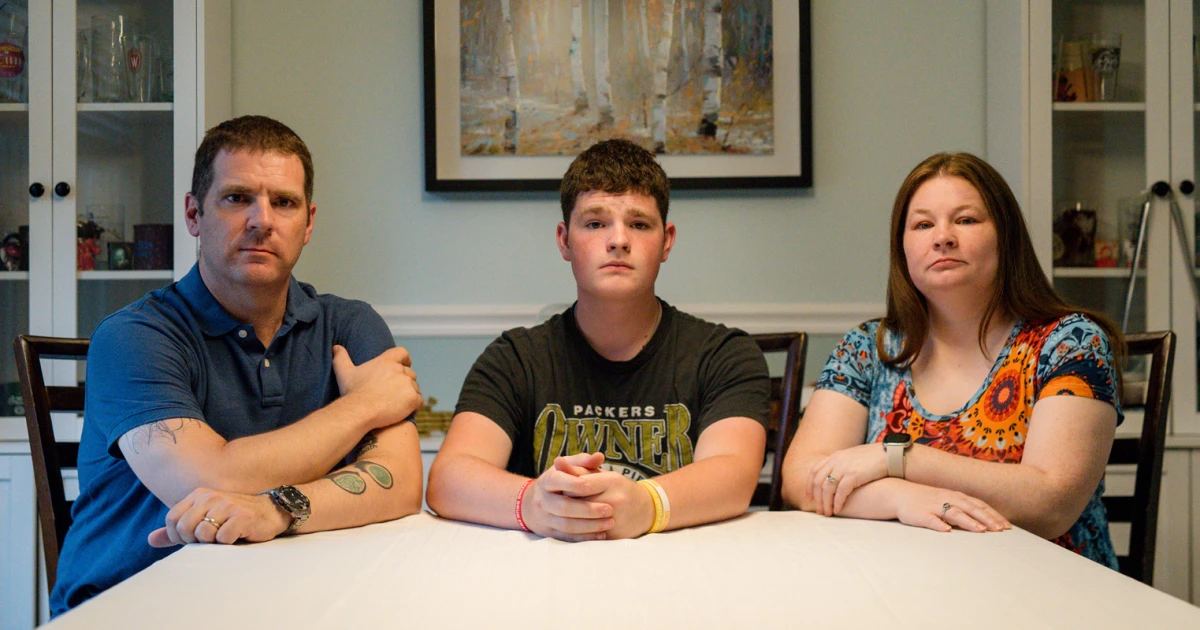Their son was ‘too unstable to function outside of hospital.’ Insurance denied his mental health treatment anyway.

“I’m just trying to make sure that he’s getting the help that he needs. Honestly, I’m not thinking about insurance or anything like that,” Benz-Bushling said. “Let’s get him somebody that can help him through these hard times, because we’re not it.”
They didn’t realize the race to get Johnathan into treatment would be the start of an insurance battle that would upend their family’s finances. In the coming months, Misty Benz-Bushling would leave her job. Her husband sold some of the rare Stephen King memorabilia that decorates their home. The couple drastically scaled back on activities for their three other children.
In discharge papers from Forest View, a doctor wrote: “Patient too unstable to function outside of hospital. Patient’s treatment needs cannot be expected to be met in a lower level of care.”
The Benz-Bushlings’ insurance provider disagreed.
Five days after Johnathan entered treatment at Newport Academy, his parents received a letter denying coverage for his stay — deeming it “not medically necessary” and writing that “treatment could be provided in a less restrictive level of care.”
“It was just completely the opposite of what the doctors at the intermediate facility said,” his father said.
“A care coordinator for insurance called and said, ‘Hey, can we help you find a therapist in town?’ And I was angry, I was upset, and I was crying, and I told her, if my son comes home now, he will end his life, and the blood will be on your hands,” his mother said.
“The system is badly broken”
The Benz-Bushlings’ experience is far from unique.
Nearly 60 million adults in the United States live with a mental health condition, however, only about 50% receive treatment, because of a variety of factors. According to the American Psychological Association, 20 million children in the U.S. have also been diagnosed with a mental health disorder and that number is estimated to be growing.
Mental health treatment in the U.S. cost $106.5 billion in 2019, according to a report from the Agency for Healthcare Research and Quality — of which private insurance paid about a third. In 2021, pediatric mental health conditions were associated with $59 billion in household spending, and made up 46.6% of all pediatric medical spending.
As the stakes get higher for patients with more serious mental health needs, so do the costs. A 2024 study found that residential addiction treatment centers for minors are “limited and costly.” The average cost quoted for a month of treatment was more than $26,000.
According to Dr. Robert Trestman, chair of the American Psychiatric Association’s Council on Healthcare Systems and Financing, stays in residential facilities typically last one to three months. Due to the high costs, he said, insurance companies are incentivized to look for reasons to send patients to a lower level of care.
“Because of the financial incentives, it’s become painful, and it’s at every level,” he said. “The system itself is broken badly.”
Insurance companies review patient files to determine whether care is medically necessary, which can be subjective, given that mental health conditions are often invisible.
“Medical necessity is not a black and white,” Trestman said. “It is a clinical determination, and the words used and the criteria vary.”
Dr. Sara Coffey, leadership chair of the department of psychiatry and behavioral sciences at the Oklahoma State University Center for Health Sciences, said residential treatment is an appropriate tool for pediatric patients who have attempted suicide, and for whom other kinds of therapy have been ineffective. Coffey wasn’t involved with Johnathan’s care.
“Residential really does serve a role in that continuum for kids that are just not progressing or that have safety concerns with their outpatient care,” Coffey said. “If there’s repeated suicide attempts, or if it feels like the work that we’re doing outpatient really isn’t leading to meaningful results, then that is often when residential can provide that additional structure and support to help kids heal.”
The Benz-Bushlings are self-insured through the husband’s job as an electrical engineer at American Electric Power, which means medical care is paid for by the employer, instead of a larger insurance company. In this type of arrangement, an employer will usually outsource the logistics of approving or denying coverage to an outside company.
In this case, the Benz-Bushlings’ insurance plan lists Quantum Health as the “care coordinator” that is responsible for determining coverage eligibility.
NBC News reached out to Quantum Health with a list of questions about Johnathan’s case. In response, a Quantum Health spokesperson said in a statement, “Quantum Health is not an insurer, insurance company or provider. We provide healthcare navigation and care coordination services to members on behalf of their employer’s health and welfare benefits program.”
“Determinations are solely based on current policy parameters regarding a member’s coverage under the specific Plan and are not a reflection of the value of the care requested care or a treatment decision,” the spokesperson wrote in an email.
In the denial letters from Quantum Health, the company writes that the details of Johnathan’s case were “reviewed against the plan document and the utilization criteria adopted by the plan.”
“Utilization criteria” refers to internal guidelines used by insurers to assess how well a patient is doing and to decide whether to cover care.
“So many are self-generated by each company and are essentially a black box because we outside don’t know what they are,” Trestman said. “It’s playing with a stacked deck of cards where the dealer is the insurer, and they control literally everything, because even the internal appeals process is inside their company.”
If you are dealing with bills that seem to be out of line or a denial of coverage, care or repairs, whether for health, home or auto, please email us at Costofdenial@nbcuni.com.
According to insurance documents reviewed by NBC News, the Benz-Bushlings’ insurance plan uses a set of guidelines called InterQual that are produced by Optum, a division of UnitedHealthcare. In an issue brief dated 2025, the American Medical Association classified the InterQual guidelines as “proprietary, financially-driven criteria.”
“These criteria often lead to delayed care through prior authorization and denied care through other financially driven, profit-based motives,” the AMA brief says.
In its statement to NBC News, Quantum said “When reviewing requests for behavioral health services, we are obligated to follow the terms of the specific Plan, including its rules for ‘medical necessity’ and ‘appropriate level of care’ based on nationally recognized criteria, such as InterQual and Locus.”
“InterQual Criteria are objective and specific, helping guide consistent, defensible decisions that ensure appropriate, quality care,” Optum’s website says, describing the guidelines as a “rigorous, evidence-based development process.”
The Benz-Bushlings appealed Quantum’s decision three times. Each time, they were denied.
Before the final denial, Quantum routed their appeal to an outside company called AllMed Healthcare Management, which it hired to conduct an independent review. AllMed upheld the denial, arguing that Johnathan had made progress over the course of his treatment and was no longer experiencing suicidal ideation. The letter found that he was “largely compliant with his treatment plan.”
According to Trestman, signs that a treatment is working can be grounds for insurers to move patients to a lower level of care — but he cautioned that because mental health is fluid, ending treatment too early can cause a patient’s progress to backslide.
“When we document in a chart, we’re trying to reflect that the care we’re providing is helping and looking for positive change, but that doesn’t mean that it’s going to stick. That doesn’t mean that it’s going to persist, or that it’s something that should justify reducing the level of care,” he said.
A 270-page appeal
Before that final denial, the Benz-Bushlings had assembled a 270-page appeal document that illustrated Johnathan’s years of mental health struggles. His depression first became noticeable in 2022, when he started to withdraw from family life and began vaping marijuana almost constantly. As he entered high school, his addiction issues became more serious.
“It got to the point where he had to be escorted everywhere that he went,” Benz-Bushling said. “He was never supposed to be alone. He was still finding ways to get THC vapes into our house, and he couldn’t get through a school day without getting high.”
To get their son away from friends who they said supplied him with drugs and alcohol, they decided to pack up their home in Virginia and move to Michigan earlier this year.
While still in Virginia, Johnathan had done therapy, intensive outpatient treatment and one earlier stint at a residential facility. When the family arrived in Michigan, they thought it was a fresh start.
But after several weeks of sobriety, Johnathan was once again suspended from school and found his parents’ alcohol supply, which was hidden in their bedroom closet. He drank to the point of blacking out while his parents were both at work. His parents returned home to find that he’d vomited and passed out.
Filled with shame for disappointing his parents when he woke up, Johnathan tried to end his own life.
“I was angry at myself,” Johnathan said. “I was upset that I disappointed my parents, because I knew they expected better for me and that I could be better.”
“It’s so hard knowing that you can’t keep your kids safe at home, and that the struggles that he’s having with mental health are so much that he thinks he doesn’t want to be here anymore, and how do you keep him safe and help him work through it?” his mother said.
With this history in mind, the Benz-Bushlings decided to pay out of pocket for as long as they could for Johnathan’s treatment.
“The director of the facility caught wind and called me and said, ‘He needs to be here. I can’t let him go. So what do we need to do?’” Misty Benz-Bushling said. “He said, ‘It would be unethical for me, as a medical professional, to send him home at this point, because he needs the treatment.’”
Misty Benz-Bushling was able to negotiate a discounted rate with Newport Academy. Still, they were only able to keep Johnathan there for seven weeks, instead of the full nine that was recommended. The stay cost the family tens of thousands of dollars.
To cover the costs, the couple took out a high-interest loan for $25,000. They also sold some belongings to fill in the gaps, like Benz-Bushling’s collection of rare, first-edition Stephen King books.
Misty Benz-Bushling left her job to ensure that Johnathan had full-time care when he returned home. They cut back on travel to visit family, as well as going out to eat and taking their younger children to the movies. Their oldest daughter had to switch colleges and enroll in virtual school because they can no longer help her with tuition payment.
To try and recover some of their costs, the Benz-Bushlings threatened a lawsuit against American Electric Power to recover their out-of-pocket costs.
NBC News reached out to American Electric Power four times after interviewing the Benz-Bushlings. One week after a followup email to the company, the Benz-Bushlings’ lawyers informed NBC News that the family and the company resolved their dispute. The terms are confidential.
After learning of the settlement, NBC News followed up again with American Electric Power.
“We are pleased that the family was able to resolve their concerns and that we were able to assist. AEP offers benefit plans that include access to a broad range of healthcare, including mental health services. In doing that, AEP does not play a role in determining what treatment is provided to any covered individual or in communicating determinations that are made under our plans,” a company spokesperson said in an email.
After treatment, Johnathan’s mental health has improved. He’s been able to get a summer job at a local hardware store and go fishing with friends.



